- Home
- Herbie Brennan
Faerie Lord Page 2
Faerie Lord Read online
Page 2
He signed the letter Henry Atherton, then immediately wrote a PS:
PS Some children broke a downstairs window, but I had it repaired with money from the Contingency Fund. He knew he should leave it at that, but somehow could not stop his hand writing: PPS I might be able to continue to look after Hodge (the cat) even after I stop looking after the house or even after I go to university. I wouldn’t want him put down or anything.
He sat staring at the words for a long time. Best not to mention the current little problem with Hodge or the fact that Henry had no idea where he was at the moment. Hodge was bound to come back – he was too old and fat and lazy to make his own way in the world any more. The trick would be to make sure Henry’s mother never got her hands on him.
… even after I go to university. How on earth would he look after a tomcat while he was attending university? But he’d think of something. He owed that much to Mr Fogarty. And to Hodge. His hands were trembling slightly as he folded the letter.
Since there was still nobody downstairs, he stole a stamp and an airmail sticker from his mother’s desk, then pulled his coat back on again; the sooner he posted this off the better. When he opened the front door, Hodge was waiting for him on the doorstep.
‘Ah, there you are,’ said Henry.
Against Hodge’s furious protests, Henry bundled him into the cat-carrier. ‘It’s for your own good,’ he hissed, sucking one thumb where the brute had drawn blood. ‘You really don’t want to hang around here.’ It was going to be a pain racing off to Mr Fogarty’s house to feed Hodge in the middle of exams, but he couldn’t see any alternative. He knew his mother.
As he waited for the bus, Henry thought about Charlie and what she’d said about not going out together any more. He was surprised how little upset he felt. He’d been close friends with Charlie ever since they were little kids, but the romantic interest had started less than a year ago and to be absolutely honest, Charlie had been keener about that than he was.
The bus journey was a nightmare. Hodge wailed all the way and several passengers took to staring at Henry as if he was committing murder. But he settled once they left the bus, and by the time Henry was carrying him along Mr Fogarty’s cul-de-sac he was looking around through the mesh of the carrier as if he recognised the place.
Mr Fogarty’s house, the last one on the street, was looking distinctly the worse for wear despite Henry’s best efforts. Most of the trouble dated back to the days of Mr Fogarty’s own occupancy – he’d pasted brown paper on the bottom panes of the downstairs windows to stop people looking in, seldom bothered with minor repairs and had a habit of leaving half-eaten hamburgers to rot down the side of his sofa. Now it was unoccupied, the process of decay was visibly accelerating. Even if Henry hadn’t been planning to leave, it would make sense to sell the place before it fell down.
He carried the caged Hodge to the front door and let himself in – he had his own set of keys. Then he walked through to the kitchen, set the carrier on the floor and unlatched the side. Hodge stretched, looked around suspiciously, then walked out slowly.
‘Do you want your Whiskas now or would you prefer to go out the back and kill everything that moves?’ Henry asked him conversationally. Hodge walked to the back door and sat down facing it. He waited patiently. ‘So it’s the killing fields, is it?’ Henry said. He walked over, shot the bolt, then unlocked the back door.
Two strangers were standing on the lawn outside.
Henry frowned. He wasn’t anything like as paranoid as Mr Fogarty, but the back garden was private property and he couldn’t see any reason for these two to be poking around.
The man was in his mid-thirties, stockily built with a shock of red hair that was turning prematurely grey. He had on a sharp green suit and suede shoes. The girl seemed a lot younger. She might have been his daughter, except she was dressed in a blouse, skirt and coat that looked as if they’d come from Oxfam.
‘Can I help you?’ Henry asked coolly.
It was like one of those scenes from a movie where everything goes into slow motion and movement seems to leave trails. The man turned (slowly) towards him. ‘Henry …?’ he said.
The girl turned towards him just as slowly. ‘Henry!’ she exclaimed. He watched the smile begin to spread like a pouring of honey, illuminating her face, transforming her into a radiant beauty.
They stared at him expectantly. Henry felt a curious emptiness in the pit of his stomach. He stared back at them blankly. Now he could see her face, he knew the girl, of course. ‘Nymph?’ he whispered.
‘Henry!’ the man said again. He began to grin and the grin told Henry at once who he was, although it was impossible.
Henry felt his jaw begin to drop and stared and stared until eventually he said what he had to say, what he knew to be true even though it wasn’t true, couldn’t possibly be true.
‘Pyrgus?’ Henry said.
Three
‘You’re old!’ Henry blurted. It was stupid, but he couldn’t think of anything else to say. They were sitting round the table in Mr Fogarty’s kitchen. Hodge had jumped onto Nymph’s lap and was curled purring while he had his ears tickled. Close up, Pyrgus still looked in his thirties, maybe even late thirties. Henry found himself wondering if this was some sort of spell thing, set up as a disguise.
‘I wouldn’t put it quite like that,’ Pyrgus said. ‘But I know what you mean.’
‘What are you doing here?’ Henry asked. What he really wanted to ask was why they were wearing ordinary clothes, Pyrgus in particular: his suit could have come from Marks and Sparks. Henry had never seen them wearing gear like that before. Clothes in the Realm were generally a bit medieval-looking and Forest Faeries like Nymph wore Grecian-style tunics, nearly always in green. ‘Why are you dressed in – ’ he pulled the word out of two-year-old depths ’ – Analogue clothes?’
‘I have to live here,’ Pyrgus said, as if that answered everything. He caught Henry’s expression and grinned again, a little sheepishly this time. ‘Nymph came with me because we got married.’
For a long beat Henry gaped in stunned amazement; then he exploded, ‘Married?’ He looked at Nymph, who smiled a little. ‘The two of you are married?’
She nodded. ‘Yes. Very shortly after you last saw us actually.’
‘You can’t be married,’ Henry said. ‘Not really.’ But he was grinning all over his face. He liked Nymph and she was perfect for Pyrgus. The way Pyrgus looked had to be a spell thing. He glanced at Nymph. ‘Don’t you miss the forest?’
‘There are forests in this world,’ Nymph said calmly. ‘A wife must be at her husband’s side.’
Charlie mightn’t go along with that one, Henry thought. She’d taken to feminism in a big way over the last six months and kept talking about independence and equality and the way women were oppressed by traditional values. Which Henry sort of agreed with really, although to be honest it wasn’t on his mind much of the time. ‘Is the age business … like, some sort of magic thing?’ he asked, returning to an earlier thought.
The smile on Pyrgus’s face disappeared as if he’d thrown a switch. ‘It’s an illness, Henry,’ he said softly. ‘That’s why we’re here.’
Four
Chalkhill was dressed in a shocking-pink silk knicker-bocker suit with fashionably clashing electric-blue suede knee boots and a sweet little lime-green slithskin apron. Brimstone stared at him in distaste. ‘Were you followed?’ he asked.
‘No, of course not,’ Chalkhill said. ‘I took precautions.’ He smiled broadly. The spell coatings on his teeth flashed and sparked and played a cheery tune. ‘Isn’t this fun? The old team back together again. Really, Silas, I’m so excited I could dance.’
‘Have you brought the money?’ Brimstone asked drily.
‘In my knickers,’ Chalkhill said. He caught Brimstone’s blank look and added, ‘In case somebody tried to steal it.’
They were waiting together on the doorstep of a lonely, tree-shrouded mansion set in the outer reache
s of the Cretch. There was a legend that it had once belonged to the Master Vampire Krantas, and whether or not this was really true, it certainly looked the part. Gothic towers and spires reached for the sky like spindly fingers. From somewhere deep inside, a bell was tolling hollowly.
‘I thought you’d given up that nonsense,’ Brimstone muttered.
‘What nonsense?’
‘The camp act,’ Brimstone said. ‘It may have served some purpose when you were spying for Lord Hairstreak, but everybody knows it’s just a performance now.’
Chalkhill sighed. ‘Perhaps, but the performance has become a part of me.’ He glanced philosophically into the middle distance. ‘It may be that life itself is a great actor seeking parts to play. It may be –’
‘Just don’t try it on with the Brotherhood,’ Brimstone told him.
They could hear slow footsteps in the depths of the building, and after what seemed like an eternity, the heavy oakwood door swung open. A hollow-eyed Faerie of the Night in evening dress stared down on them. ‘Ah, Brimstone,’ he said. The eyes swung to regard Chalkhill with an ill-concealed expression of disgust. ‘And this must be the Candidate.’
Brimstone nodded shortly. He felt no urge to explain. Everybody knew Chalkhill’s only real function was to provide money. Lots of money, warm from the knickers.
‘Walk this way.’
They followed the creature through a maze of winding corridors until they emerged into an enormous stone-flagged kitchen. The forbidden smell of Analogue World coffee wafted from a cauldron on the stove. Brimstone wondered briefly if it was to be used as an hallucinogenic.
Their hollow-eyed guide looked around him, frowning. ‘Wrong turn,’ he muttered. He swung on his heel. ‘This way,’ he said firmly.
They approached, and passed, a sweeping staircase. ‘D’Urville!’ a voice hissed angrily.
D’Urville stopped and looked up. ‘Ah, there you are, sir,’ he said.
Brimstone recognised the Faerie of the Night at the head of the stairs as Weiskei, the Brotherhood Sentinel, a beaky little pain-in-the-ass with a habit of sticking his nose in where it wasn’t wanted. He was wearing a red robe with his official lamen on the breast and carrying a ridiculous ceremonial sword. He stared at Chalkhill with even more distaste than D’Urville had. ‘I take it this is the Candidate?’
Brimstone nodded.
‘Why is he dressed like a circus clown?’
Chalkhill started to say something, but Brimstone signalled him to silence. ‘Where do we get ready?’ he asked shortly.
Weiskei glanced at him. ‘You’re Sponsor, are you not, Brother … Brother … ah, Brother …?’
‘Brimstone,’ Brimstone said, frowning with irritation. What was the matter with the man? They’d only known each other for a quarter of a century; not well, admittedly, but well enough. Unless Weiskei was trying for a put-down, the little tort-feasor.
‘Brimstone,’ Weiskei echoed and there was a momentary blankness in his eyes that was disturbing. But he rallied quickly. ‘Follow me.’
They followed him to the antechamber of the Lodge Room, a stuffy pigeonhole of a place with heavy black curtains blocking any daylight from its windows. The only illumination came from the stub of a candle stuck onto a skull on a side table. It was supposed to remind the Candidate of his own mortality, but Chalkhill didn’t seem impressed.
Weiskei pompously took up guard position with his back against the Lodge Room door and his ceremonial sword upraised. Brimstone swung his demonologist’s shawl over his shoulders. ‘Take off your shoes and socks,’ he instructed Chalkhill. Then, as an afterthought, ‘And that idiotic apron.’ As a petulant expression began to crawl across Chalkhill’s fleshy face, he added patiently, ‘It’s symbolism, Jasper. Supposed to show humility.’
‘Oh, very well!’ Chalkhill exclaimed.
The man had painted his toenails! Was there no end to his theatrics? Brimstone looked away tiredly. There was nothing he could do. There was nothing anybody could do. The Brotherhood was desperate for Chalkhill’s money.
They settled down to wait. The candle had started to gutter precariously before the Lodge Room door finally opened.
A loin-clothed creature with a jackal’s head peered out.
‘Good grief!’ Chalkhill exclaimed.
‘Hoodwink the Candidate, Brother Sentinel,’ the creature instructed, his voice muffled by the mask.
‘At once, Brother Praemonstrator!’ Weiskei exclaimed, snapping to attention. He produced a hoodwink from the folds of his robe and pulled it over Chalkhill’s head. Brimstone knelt quickly and rolled Chalkhill’s left trouser leg up to his knee. Chalkhill giggled.
The man was utterly impossible. But obscenely rich, Brimstone kept reminding himself. And the Brotherhood had never needed his money more than it did today.
Not if they wanted to regain their former glory.
Five
The battlefield looked exactly the way it did the day the Civil War ended. Evidence of violence was everywhere. Spell-driven explosives had gouged vast craters out of solid rock. Grasslands were withered and burned. The few surviving trees stood barren and bare. There were mangled, bleeding bodies everywhere, most motionless, some mewling softly in their pain, a few still trying desperately to crawl away on limbless stumps.
The illusion was perfect. You could smell the blood and the unmistakable stench of military magic. Blue picked her way carefully through the debris, her face impassive. The memorial was here by her order. It was her penance.
Although she knew the bodies were phantoms, she only knew it with her head. Her gut clenched in pity and horror – the horror she herself had brought about. She talked to no one about it, not even Madame Cardui, but she knew beyond a doubt that had she made different decisions when she first became Queen, the brave soldiers immortalised in this gory spectacle would never have died. The Realm would never have rent itself in two. Faerie would not have fought faerie. The guilt of it drove her back. For one full day in every month, Blue forced herself to walk and look and smell and remember.
Her guards were two squat demons. The vicious little brutes scampered from rock to rock several yards away, but she knew from experience their stubby wrings could carry them to her side within a second if danger threatened. She only ever came here accompanied by the demons. She claimed the choice was political: she was Queen of Hael now, after all. But the real reason was that she could not bring herself to parade her guilt in front of her regular faerie guard. Even penance had its limits.
One of the pseudo-corpses was an officer she knew by sight, a former Captain in the Palace Guard. He would have been a Major now, if things had been different, maybe even a Colonel. Instead he was dead, his real body buried in the military plot on Imperial Island. One small tragedy within the greater tragedy, yet it was this memory that forced a tear from Blue’s eye. She wondered, not for the first time, whether the Realm would have been a better place had she followed her brother’s example and refused the throne when it was offered her.
The thought of Pyrgus brought her attention back to the here and now and the crisis that might yet become a greater threat to the Realm even than the Civil War. Was there anything more she should be doing? She ran through the checklist in her head and decided there was not. What else could she do? What else could anyone do? Some things were beyond control, even for a Queen. But at least Pyrgus had a chance now, since she’d insisted he live in the Analogue World. He mightn’t like her decision, but he’d had to admit it made sense. And mercifully, events back here were moving slowly. While that continued, there was hope.
She wished Henry were with her.
Even now, so long after it happened, Blue felt herself flush at the memory. How stupid she’d been! Admittedly she was just a child then, scarcely more than fifteen, but even so she should have known better. Men never liked to feel pursued and boys were even worse. She’d been mad to ask Henry to marry her. Anyone with half a brain could have told her what he would do. In fact Ma
dame Cynthia had told her wrhat he would do, but Blue had typically ignored the advice, She sighed. Where was Henry now? Still at home in the Analogue World, of course, but did he have a steady girlfriend? Was there someone in his life who took his hand and smoothed back his hair and made him feel a little better about himself?
It was stupid, but she felt a rush of sadness that even overwhelmed her guilt about the Civil War.
The demons were by her side. Blue jerked away on reflex – she could never get used to the speed with which the creatures moved … or her basic revulsion to the breed. But they meant her no harm, of course. Their red eyes were staring outwards, their bodies in defensive posture. These were her subjects now, whether she liked it or not, and they would protect her without a single thought for their own lives.
Blue followed the direction of their gaze to find out what had triggered the alert. The gruesome battlefield stretched out dismally in all directions, but there was a figure silhouetted on a distant hillock, and the fact that it was upright meant it was no illusion. The demons were watching it intently, chittering softly to each other in those curious lobster-claw clicks they used in places where telepathy was blocked.
‘At ease,’ Blue said softly. It made little difference. Both her guardians were aquiver, watching the approaching figure like cats focused on a bird. She had a horror that one day they would disembowel an innocent, perhaps some poor subject who pressed forward to present a petition. So far it hadn’t happened: demonic discipline was extraordinary. But she still worried.
The figure was a messenger. She could tell by the curious loping gait as it approached. As it came closer, it resolved itself into a trance-runner, prominently identified by the insignia of his Guild. The man’s eyes were fixed on a point high in the sky, while his right hand clutched an ornate ceremonial dagger that he plunged up and down as if it were a staff. Somehow he managed to avoid all obstacles.

 Through the Wardrobe
Through the Wardrobe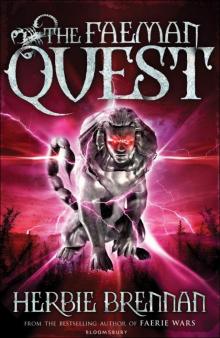 The Faeman Quest fw-5
The Faeman Quest fw-5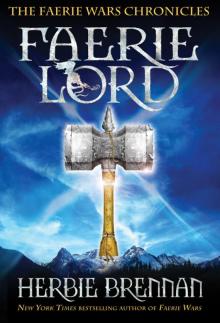 Faerie Lord
Faerie Lord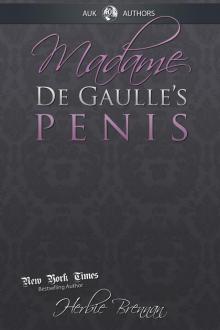 Madame de Gaulle's Penis
Madame de Gaulle's Penis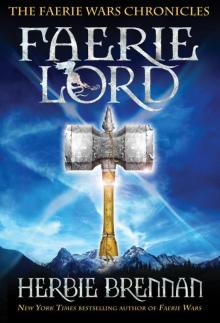 Faerie Lord fw-4
Faerie Lord fw-4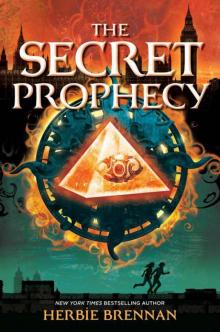 The Secret Prophecy
The Secret Prophecy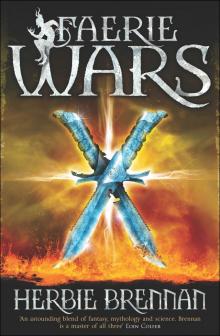 Faerie Wars
Faerie Wars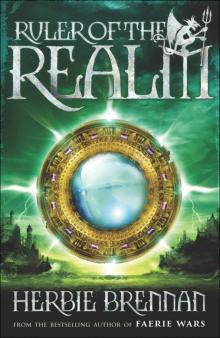 Ruler of the Realm
Ruler of the Realm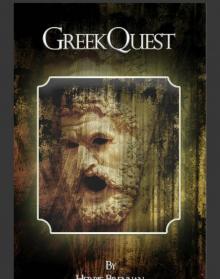 GreekQuest
GreekQuest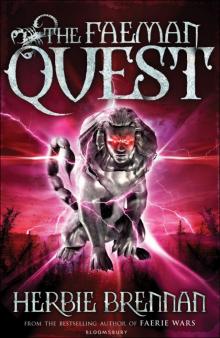 The Faeman Quest
The Faeman Quest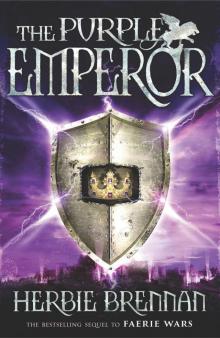 The Purple Emperor
The Purple Emperor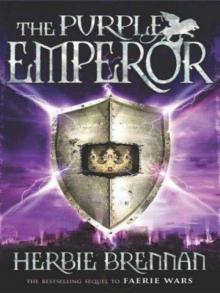 The Purple Emperor fw-2
The Purple Emperor fw-2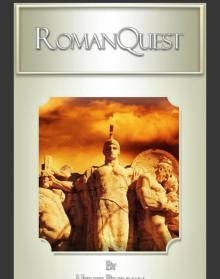 RomanQuest
RomanQuest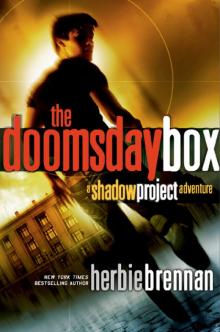 The Doomsday Box
The Doomsday Box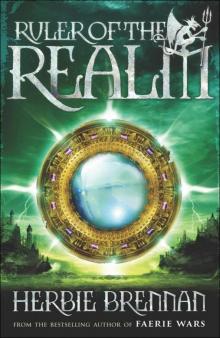 Ruler of the Realm fw-3
Ruler of the Realm fw-3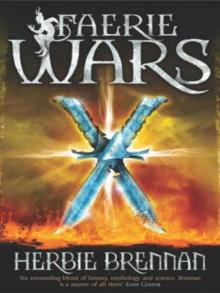 Faerie Wars fw-1
Faerie Wars fw-1